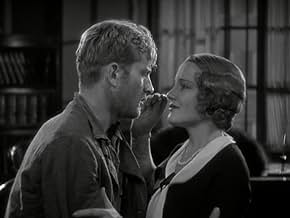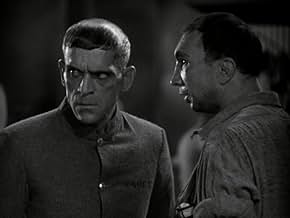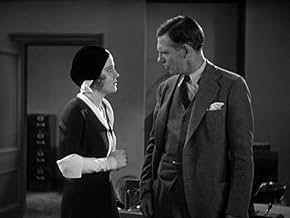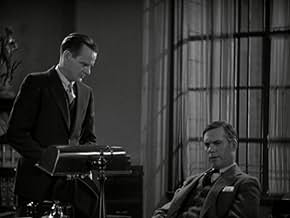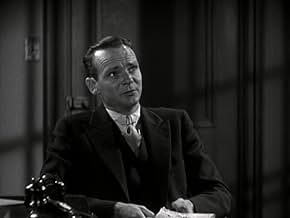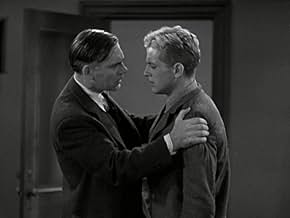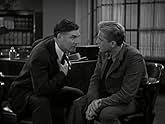VALUTAZIONE IMDb
6,9/10
1546
LA TUA VALUTAZIONE
Dopo un fallito tentativo di candidarsi a governatore, il procuratore distrettuale Mark Brady viene nominato direttore del carcere statale dove sono incarcerati molti dei criminali da lui pe... Leggi tuttoDopo un fallito tentativo di candidarsi a governatore, il procuratore distrettuale Mark Brady viene nominato direttore del carcere statale dove sono incarcerati molti dei criminali da lui perseguiti.Dopo un fallito tentativo di candidarsi a governatore, il procuratore distrettuale Mark Brady viene nominato direttore del carcere statale dove sono incarcerati molti dei criminali da lui perseguiti.
- Regia
- Sceneggiatura
- Star
- Candidato a 1 Oscar
- 3 vittorie e 1 candidatura in totale
DeWitt Jennings
- Captain Gleason
- (as De Witt Jennings)
Paul Porcasi
- Tony Spelvin
- (as Paul Porcassi)
Richard Bishop
- Minor Role
- (non citato nei titoli originali)
Andy Devine
- Cluck - a Convict with knife
- (non citato nei titoli originali)
James Guilfoyle
- Detective Doran
- (non citato nei titoli originali)
Frank Hagney
- Prison Guard in Yard
- (partecipazione non confermata)
- (non citato nei titoli originali)
Recensioni in evidenza
The Criminal Code (1931) is often passed over when it comes to discussion of the films of Howard Hawks, but it's actually one of my favorites from him.
There are a lot of stagey aspects to be sure and the central love story is pretty boring, but there's just so much to love. The film experiments with sound, overlapping dialogue and using crowd noise as a plot element.
The two standout actors are Walter Huston and a pre-stardom Boris Karloff. Anytime either of them walks on screen, everyone else just evaporates. Huston does a great job making the audience love and despise his character. And Karloff is just mesmerizing as Galloway, a convict hell-bent on vengeance.
No masterpiece, but it is an early sign of Hawks' genius. And I would take it over Bringing Up Baby (1938) and His Girl Friday (1940) any day of the week.
There are a lot of stagey aspects to be sure and the central love story is pretty boring, but there's just so much to love. The film experiments with sound, overlapping dialogue and using crowd noise as a plot element.
The two standout actors are Walter Huston and a pre-stardom Boris Karloff. Anytime either of them walks on screen, everyone else just evaporates. Huston does a great job making the audience love and despise his character. And Karloff is just mesmerizing as Galloway, a convict hell-bent on vengeance.
No masterpiece, but it is an early sign of Hawks' genius. And I would take it over Bringing Up Baby (1938) and His Girl Friday (1940) any day of the week.
"The Criminal Code" is centered around the theme "An Eye for An Eye." This theme is the reason that young Robert Graham is sent to prison, the reason why the prisoners object to the D.A. becoming the Warden of the prison, and the reason why Graham is sent to "the hole" near the end of the film. For 1931, it was one of the first critical looks at this theme. It raises certain questions as to the morals of the law, and the Criminal Code versus the Prisoners Code. Phillips Holmes gives a good enough performance as Robert Graham, and Boris Karloff came off well as the inmate with a bone to pick (months before becoming Frankenstein), but the performance that I liked the most was Walter Huston, who played the D.A.-turned-prison-warden. Huston's character was a wily one, who said "Yeah" and "Yeah?" about a hundred times throughout the film.
In The Criminal Code the bywords of District Attorney Walter Huston is that where there is a crime, someone has to pay. Or if you can't do the time, don't do the crime as a later philosopher named Tony Baretta opined. And it's Huston's job to set the price when he prosecutes.
But Huston recognizes that young Phillips Holmes with a proper criminal defense attorney might do little time or even be acquitted. He smashed some poor guy's head in with a full bottle of bootleg hooch when he thought he was going for a gun. Still Holmes is convicted and he gets a ten year sentence.
Fast forward several years and Huston is no longer the District Attorney, he's now the warden of the prison that Holmes is incarcerated. Huston gives Holmes a chance and he makes him a trustee. Huston's daughter Constance Cummings even falls for Holmes.
But they have a different code among the convicts in prison and the biggest commandment is thou shalt not rat. When Boris Karloff does a particular rat in Holmes almost takes the fall for it because of that code.
The leads do a fine job in this, but the performances of Boris Karloff as the hardened convict and Clark Marshall as his victim really do stand out in The Criminal Code. Marshall especially, you can really feel his fear in his performance.
Beginning originally as a Broadway play, The Criminal Code was remade twice by Columbia Pictures, Harry Cohn not being one to let a good property go to waste. The two remakes are Penitentiary with Walter Connolly and John Howard and Convicted with Broderick Crawford and Glenn Ford.
The film holds up very well because the themes are eternal. Criminals have to pay the price when caught and rats are just as unpopular as ever.
But Huston recognizes that young Phillips Holmes with a proper criminal defense attorney might do little time or even be acquitted. He smashed some poor guy's head in with a full bottle of bootleg hooch when he thought he was going for a gun. Still Holmes is convicted and he gets a ten year sentence.
Fast forward several years and Huston is no longer the District Attorney, he's now the warden of the prison that Holmes is incarcerated. Huston gives Holmes a chance and he makes him a trustee. Huston's daughter Constance Cummings even falls for Holmes.
But they have a different code among the convicts in prison and the biggest commandment is thou shalt not rat. When Boris Karloff does a particular rat in Holmes almost takes the fall for it because of that code.
The leads do a fine job in this, but the performances of Boris Karloff as the hardened convict and Clark Marshall as his victim really do stand out in The Criminal Code. Marshall especially, you can really feel his fear in his performance.
Beginning originally as a Broadway play, The Criminal Code was remade twice by Columbia Pictures, Harry Cohn not being one to let a good property go to waste. The two remakes are Penitentiary with Walter Connolly and John Howard and Convicted with Broderick Crawford and Glenn Ford.
The film holds up very well because the themes are eternal. Criminals have to pay the price when caught and rats are just as unpopular as ever.
I would say it is THE best except for my fondness for "Caged." This is a brilliant movie, as shocking as Hawks's "Scarface," released a year later and far better known.
Walter Huston is a district attorney when we met him. Throughout, he is given to the one word, catchall statement or response "Yeah." Huston has rarely if ever been better -- and he was one of the greats of Hollywood history.
Phillips Holmes is excellent as a young man he sends to prison. He is innocent in all senses before he gets there. But he quickly leans the code of the title.
Constance Cummins isn't given much as Huston's daughter but she is appealing. However, Boris Karloff gives one of his very finest performances as a tough but decent prisoner. Of course, of course he is fine in "Frankenstein." And he is wildly brilliant in "Lured" many years later. Here he gives a solid, unadorned, moving performance.
Clark Marshall, a name I do not recognize, is also fine. He plays a sniveling, conniving inmate. And DeWitt Jennings is shocking as a brutal guard.
Amazingly, I had never seen this movie before tonight. It's bone I will want to see again; and I urge you to see it, too.
Walter Huston is a district attorney when we met him. Throughout, he is given to the one word, catchall statement or response "Yeah." Huston has rarely if ever been better -- and he was one of the greats of Hollywood history.
Phillips Holmes is excellent as a young man he sends to prison. He is innocent in all senses before he gets there. But he quickly leans the code of the title.
Constance Cummins isn't given much as Huston's daughter but she is appealing. However, Boris Karloff gives one of his very finest performances as a tough but decent prisoner. Of course, of course he is fine in "Frankenstein." And he is wildly brilliant in "Lured" many years later. Here he gives a solid, unadorned, moving performance.
Clark Marshall, a name I do not recognize, is also fine. He plays a sniveling, conniving inmate. And DeWitt Jennings is shocking as a brutal guard.
Amazingly, I had never seen this movie before tonight. It's bone I will want to see again; and I urge you to see it, too.
Robert Graham (Phillips Holmes) accidentally kills a man and is imprisoned for manslaughter. Some years later, the district attorney who - applying the criminal code verbatim - had got him into jail (Walter Huston) becomes prison warden and tries to rehabilitate him. That turns out to be hard because Graham has meanwhile learned another kind of criminal code: the values and standards that govern the behaviour of the prisoners. This is a well-intentioned film that is critical of the way the US prison system was run. It tells a good story and manages to generate a lot of suspense. The pacing is good, too - the thing gets never dull. There is even a bit of a romance, though this plays a rather minor role. I found the quality of the acting somewhat mixed. Huston, Holmes and Boris Karloff (who plays another prisoner) are doing very well, Constance Cummings (Huston's daughter and Holmes love interest) less so: At least in some scenes, she appeared rather wooden and stiff. What I found disappointing is the quality of the dialogue. Huston's default answer to almost anything he is told seems to be 'oh yeah?!' (a few years later - in 'It Happened One Night', 1934 - Clark Gable would make fun of dialogues that consisted of nothing but 'oh yeah?!'s). Whoever wrote the dialogues for 'The Criminal Code' did this otherwise good film no service.
Lo sapevi?
- QuizThe prison yard sequence was shot at M-G-M, using the set originally built for "The Big House" (1930).
- BlooperPaul Porcasi's name is spelled "Porcassi" in the opening credits.
- Citazioni
Mark Brady: [to Graham] Tough luck, Bob, but that's the way they break sometimes. You got to take them the way they fall.
- Curiosità sui creditiThe film's credits do not say that Howard Hawks directed the film; instead, they say that the film is "A Howard Hawks Production."
- ConnessioniAlternate-language version of El código penal (1931)
I più visti
Accedi per valutare e creare un elenco di titoli salvati per ottenere consigli personalizzati
Dettagli
- Data di uscita
- Paese di origine
- Lingua
- Celebre anche come
- The Criminal Code
- Luoghi delle riprese
- Azienda produttrice
- Vedi altri crediti dell’azienda su IMDbPro
- Tempo di esecuzione
- 1h 37min(97 min)
- Colore
Contribuisci a questa pagina
Suggerisci una modifica o aggiungi i contenuti mancanti

